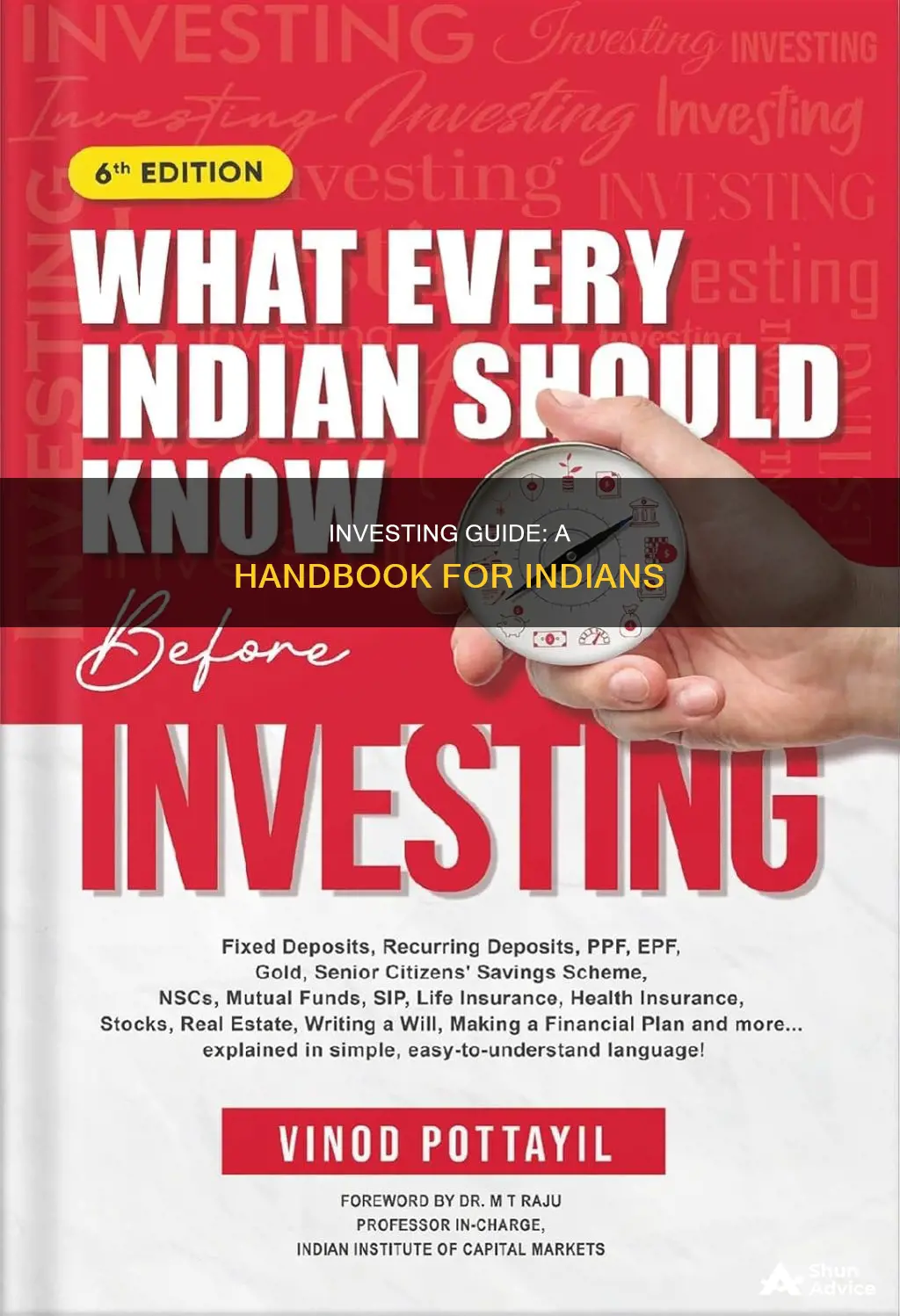
What Every Indian Should Know Before Investing is a comprehensive guide to investment options in India. The book covers a wide range of topics, including fixed deposits, mutual funds, stocks, real estate, and more. It also discusses the advantages and disadvantages of each investment option, as well as important considerations such as taxation and financial planning. With simple explanations and a focus on practical insights, this book is an invaluable resource for Indians looking to make informed investment decisions and secure their financial future.
What You'll Learn

Fixed Deposits, Recurring Deposits, and Senior Citizen's Savings Schemes
Fixed Deposits, Recurring Deposits, and Senior Citizen Savings Schemes
Fixed Deposits (FDs)
Fixed Deposits are one of the most preferred forms of investment in India due to their safety and guaranteed returns. FDs are offered by banks and non-banking financial companies (NBFCs) with varying interest rates and tenures. When investing in an FD, individuals can choose the tenure of their deposit, typically ranging from 7 days to 10 years, and the interest rate offered by the financial institution. FDs also provide investors with the option of premature withdrawal, although this may incur a penalty. Additionally, FDs can be used as collateral to obtain loans, and the maximum loan amount sanctioned depends on the principal sum of the FD. It is important to note that FDs are insured by the Deposit Insurance and Credit Guarantee Corporation (DICGC) for up to ₹5 lakhs.
Recurring Deposits (RDs)
Recurring Deposits offer individuals an opportunity to build their savings through regular monthly deposits of a fixed sum over a specified period. The minimum period for an RD is 12 months, while the maximum is 120 months. The minimum deposit amount is ₹100 per month, and individuals can choose to deposit multiples of ₹10 thereafter. It is important to make timely payments for RDs, as a penalty is charged for delayed instalments. Additionally, if six consecutive instalments are not received, the account will be prematurely closed, and the remaining balance will be paid to the account holder. RDs also offer features such as nomination facility, universal passbook, and the option to avail loans against the deposit.
Senior Citizen Savings Schemes
Senior Citizen Fixed Deposit schemes are a type of FD that offers individuals aged 60 years and above a slightly higher interest rate than general citizens' FDs. These schemes have a minimum deposit amount that varies across banks and a tenure ranging from 7 days to 10 years. While most schemes offer an additional FD rate, typically ranging from 0.25% to 0.65%bulk deposits may not provide preferential rates. Additionally, banks may calculate interest on a quarterly compounding basis or offer other options such as monthly, annual, or semi-annual compounding. Senior citizens can also benefit from tax deductions under Section 80TTB of the Income Tax Act, claiming up to ₹50,000 on interest income from these FDs.
Strategies to Promote Your New Investment Portfolio
You may want to see also

Mutual Funds, SIPs, and Stocks
Mutual funds are a type of investment vehicle where money from multiple investors is pooled together and invested in a variety of securities such as stocks, bonds, and other assets. The main advantage of mutual funds is that they provide diversification and are managed by professional fund managers. The book covers the basics of mutual funds, including the different types available and how to invest in them. It also discusses the tax implications of investing in mutual funds.
Systematic Investment Plans (SIPs) are a way to invest in mutual funds. Instead of investing a lump sum all at once, SIPs allow investors to contribute a fixed amount of money at regular intervals, such as monthly or quarterly. This helps with discipline and also averages out the cost of investing, reducing the impact of market volatility. The book includes SIPs as part of its discussion on mutual funds, providing an overview of how they work and their benefits.
Stocks, also known as equities, represent ownership in a company. When you buy a stock, you become a shareholder and have a claim on the company's assets and profits. Stocks are typically considered riskier than other investments but also offer the potential for higher returns. The book covers the basics of stock investing, including how to analyse stocks, the different types of stocks available, and the advantages and disadvantages of stock investing. It also discusses the tax implications of stock investments.
In addition to these topics, the book also covers other important aspects of investing, such as life insurance, health insurance, writing a will, and making a financial plan. It provides a holistic view of investing and is a comprehensive guide for Indians looking to improve their financial literacy and make informed investment decisions.
Equity Investment Management: Understanding the Basics
You may want to see also

Real Estate, Gold, and Cryptocurrencies
Real Estate
Real estate is a popular investment option in India, and the book acknowledges this. It provides an in-depth analysis of investing in real estate, including the advantages, disadvantages, and tax implications. Real estate investments can be complex, and the book aims to simplify the process for readers. It offers valuable insights into the Indian real estate market and helps investors make informed decisions.
Gold
Gold is another traditional investment option that Indians favour. The book covers this option extensively, discussing the various aspects of investing in gold. This includes understanding the gold market, the different forms of gold investments available (such as jewellery, bars, coins, etc.), and the factors that influence gold prices. The book also provides guidance on how to invest in gold wisely and the tax implications of gold investments.
Cryptocurrencies
The book recognises that cryptocurrencies are a relatively new investment avenue in India. It introduces readers to the world of cryptocurrencies, explaining what they are, how they work, and the potential benefits and risks associated with investing in them. The book also provides an overview of the Indian government's stance on cryptocurrencies and the regulatory environment surrounding them. Given the dynamic nature of the cryptocurrency market, the book emphasises the importance of understanding the risks and staying informed about the latest developments in this space.
Overall, "What Every Indian Should Know Before Investing" offers a comprehensive and accessible guide to these three investment options. It empowers readers with the knowledge and insights needed to make well-informed decisions about real estate, gold, and cryptocurrency investments, helping them navigate the complex world of investing with confidence.
East West Investment Management: What Went Wrong?
You may want to see also

Life Insurance and Health Insurance
Life insurance provides financial protection for your family or dependents in the event of your death. It ensures that they will have the financial resources they need to maintain their standard of living and cover any expenses. There are different types of life insurance policies available, and it is important to choose one that best suits your needs and goals.
Health insurance, on the other hand, covers your medical expenses in case of an illness or injury. In India, the cost of healthcare can be high, and without insurance, you may end up paying a significant amount of money out of pocket. Health insurance can help you access quality medical care without incurring financial hardship.
When selecting a health insurance plan, it is important to consider your budget, the coverage offered, the network of hospitals and doctors, and any exclusions or limitations. Additionally, understand the claim process and the steps involved in filing for reimbursement or cashless treatment.
Both life and health insurance are crucial components of a comprehensive financial plan. They provide security and peace of mind, ensuring that you and your loved ones are protected against financial risks. By investing in these types of insurance, you can rest assured that you are prepared for whatever life may bring.
In India, there are various options available for life and health insurance, and it is important to carefully consider your choices before making a decision. The book "What Every Indian Should Know Before Investing" by Vinod Pottayil provides valuable insights and guidance on these topics, helping readers navigate the complex world of insurance and make informed decisions.
Key Features of an Investment Portfolio
You may want to see also

Financial Planning and Making a Will
Financial planning is a comprehensive process that involves setting financial goals, creating a budget, managing debt, and investing wisely. It is a roadmap to help individuals achieve their financial objectives, such as saving for retirement, buying a home, or investing in their children's education. Effective financial planning requires individuals to assess their current financial situation, identify their short-term and long-term goals, and develop a strategy to achieve those goals. This may include creating a budget that allocates income across expenses, savings, and investments, while also considering factors such as inflation and risk management.
Making a will, on the other hand, is a critical component of estate planning. It ensures that an individual's wishes are carried out after their death and that their assets are distributed according to their desires. A will allows individuals to designate beneficiaries, appoint executors, and specify how their property, investments, and other assets should be handled. It is a legal document that provides clarity and peace of mind, knowing that their loved ones will be taken care of and their legacy protected.
The book recognises that financial planning and will-making are interconnected, as effective financial planning considers potential tax implications and legacy planning. By addressing these topics, the book empowers readers to make informed decisions about their financial future and ensure their wishes are honoured. It provides valuable insights into the importance of financial literacy and encourages individuals to take control of their financial lives, make informed investments, and secure their financial well-being.
Additionally, the book offers a holistic view of investing by covering essential topics such as life insurance and health insurance. By exploring these areas, readers can gain a deeper understanding of personal finance and make more informed decisions about their financial future. The book's practical approach, with examples and simple explanations, ensures that readers can apply the concepts in their own financial planning journey.
Forestry Managed Investment Schemes: How Do They Work?
You may want to see also
Frequently asked questions
The book is a comprehensive guide to investment options in India. It covers various investment avenues, from FDs, RDs, and Mutual Funds to Real Estate, Stocks, and more. It also includes chapters on financial planning, life insurance, health insurance, and writing a will. The book aims to provide simple and easy-to-understand explanations for common investors.
The book is written by Vinod Pottayil.
The book covers a range of investment options, including Fixed Deposits, Recurring Deposits, PPF, Gold, Mutual Funds, SIP, Real Estate, and more. It also discusses financial planning, with topics such as provident funds, making a will, and understanding liabilities and growth potential.
The book is suitable for anyone interested in investing and financial planning, especially beginners. It is written in simple language and provides a holistic view of investing, making it accessible to those new to the field.
The book includes helpful QR codes and web links to external resources, providing additional information for readers. It also has a chapter specifically dedicated to women in investing, their roles, and the importance of their involvement in financial planning.







